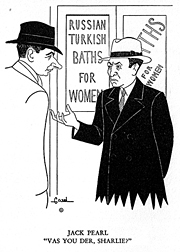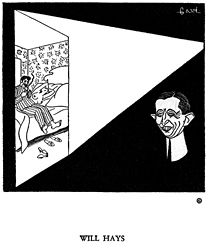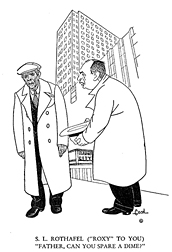Here’s Chapter 8 of In Your Hat, the 1933 tell-all memoir by Hat Check Girl to the Stars, Renee Carroll, in which she shares tales of by the many celebrities she encountered while working at Sardi’s, among them George Burns and Gracie Allen, Eddie Cantor, George Jessel, Norma Talmadge, George Raft, Wallace Reid, Ginger Rogers, Douglas Fairbanks, and many more.

A STOOGE, in Broadway parlance, is the assist in the act. If you do an accordion routine and a heckler is paid by you to annoy your act from the box, then you’re probably Phil Baker and your stooge eventually becomes as famous as you are. Witness Sid Silvers of Take a Chance fame.
Broadway is full of stooges, both in real life and on the stage. It may sound strange to you but the jester in the king’s court from the time of The Erl King (I don’t know why they insist on spelling Oil as Erl) has been brought down the years until now he is labeled “stooge.” His job is to take he hard knocks, furnish the opportunity for the gag to be sprung, and appear the perfect fool.
When Phil Baker, who pumps a mean accordion, opened in a show in New York and had a stooge in the box doing the regular routine, Al Boasberg, the gagman who writes funny lines for a dozen or more comedians, wired Baker:
| LIKED YOUR ACT STOP THE OLD GENT WITH THE ACCORDION WAS GOOD TOO. |
Gracie Allen, of the famous team of Burns and Allen, is the stooge of the act, even though it is she who pulls all the funny lines. Recently she gave George Burns cause to laugh when she came to him with an idea.
“Georgie, dear,” Gracie said. “I have an idea.”
“Well, let’s forget it,” George answered characteristically, knowing it would bring on the usual headache.
“I’ve thought of a line for our act,” she continued.
“All right,” gave in George. “What is it?”
“I can’t tell you until I’ve gotten a prop.”
“What sort of a prop?”
“A muff.”
“What’s a muff?” George wanted to know.
“It’s one of those things women used to carry around so that they could hold hands with themselves.”
“All right, Gracie, get yourself a muff and let’s have the gag.”
She went to the best furrier on the Avenue and ordered a muff made. It has to be matched sables, four skins, exquisitely sewn. The muff cost $250 and she charged it to Geroge Burns, her husband. She brought it to him one day.
 “Here’s the muff, George.”
“Here’s the muff, George.”He examined it carefully. He approved.
“I got it at a bargain, George.”
George immediately became suspicious.
“How much, Gracie? How much?” he pleaded.
“Well—er—two hundred and—er—fifty dollars.”
George felt around for support.
“Two hundred and fifty smackers for that thing? Gracie, you’ll ruin me!”
“But it’s a bargain, George, and the furrier let me have it at that price because there are two holes in it!”
And she held up the muff to show him the holes in which one is supposed to insert one’s hands. Burns was nonplused.
“But what about the gag?” he wanted to know. “Is the gag worth $250?”
“Why, George,” giggled the she-stooge, “I just did it. You see, I come on with this muff and you ask me how much I paid for it and I say: ‘I got it at a bargain because it had two holes in it.”
With which Mr. Burns fainted dead away. And that’s how jokes are born in case you’re interested.
Rubinoff (and his violin), the old maestro who plays the air waves as musical background for Eddie Cantor, is probably the most prominent of the stooges. For every program on which the two are heard together, Eddie takes the violinist for some sort of a ride. There is no kickback, however, because thousands of letters are received weekly by Rubinoff from radio fans who express their contempt for Cantor and full sympathy for Rubinoff. Eddie’s gibes have probably won more friends for Rubinoff than his violin.
Because of the air partnership, Cantor and Rubinoff have become a sort of Damon and Pythias of Broadway. The musician makes every possible effort to get every photograph of Cantor available to hang in his dressing room. Eddie gave him a valuable gold watch in turn. And when a comedian like Jessel or Price plays the Paramount Theatre, Rubinoff goes around with a glum face asking everyone he meets if they don’t think Cantor would have done much better.
And speaking of Rubinoff reminds me of the time I went apartment hunting with a friend and a real estate agent. The agent had been telling us stories about celebrities who rented apartments from him, and it seems that Rubinoff was one of them. The agent seemed to know something about music appreciation because he had to listen to his tenants play before he could get the rent.
“You can’t tell nowadays,” he told us. “One man’s meat is another man’s poison. Take the case of Albert Spalding, the famous violinist who went to Boston for a concert. He took a room in a hotel and began to practice on his fiddle. A couple of minutes after he started, the clerk downstairs received a phone call from an irate patron who was in the room next to Spalding’s. ‘There’s a damned amachoor practicing on a fiddle next door and if he isn’t stopped in five minutes I’m going to move out!’ was the startling complaint.
“Well, needless to say, he moved. But what I want to bring out is this: that Rubinoff is also one of our patrons, and when he starts to practice in his apartment, every tenant in the house opens his door wide and sits enthralled.”
The agent signed deeply.
“There’s no telling. No, sir, no telling what’s coming next.”
I don’t know which story will peeve Rubinoff more, the one above or the story about his affair with that gal in Harrisburg—which can’t be printed. But believe you me, I’m having fun, Mr. Rubinoff, and nothing more. Good, clean fun.
George Jessel uses himself as a stooge, telling stories that will bounce back. But sometimes he uses his relatives in a disparaging fashion.
Jessel’s favorite story about his poor relations concerns the one who came backstage one day and saw George getting ready for his act. The performer was donning his newest necktie.
“Look,” the relative shouted. “I need money.”
“So what?” Jessel wanted to know. “Who doesn’t?”
“Times are terrible.”
Jessel was angry.
“Am I a step-child of Old Man Depression? Times are bad for me too. Do you begrudge me what I’ve got?”
The relative wailed for a while and then burst into his lament.
“I don’t know why you’re so selfish, Georgie.”
Jessel went up in smoke. He demanded to know how anyone could think he was selfish.
“Well,” explained the poor relation hesitantly, “you’ve got a new necktie and we haven’t even got a piano!”
Jessel occasionally uses Norma Talmadge for a stooge too. When she decided to make public appearances again, the news went out that Miss Talmadge wanted a divorce so that she might marry Jessel. Finally the announcement was made that the movie star was speeding east to make a series of personal appearances in as many theatres as the public would stand for.
On the morning her train was due the press agent who was bound for the station to meet her asked if I’d like to come along. I went.
At the Grand Central Terminal Jessel arrived with his lady fair. The train was just pulling into the station and the photographers who were sent by the newspapers set up their cameras to catch a picture of Talmadge. Jessel came dashing off the last car and ran pell mell into us. Buttonholing the press agent he whispered:
“For God’s sake don’t let these fellahs take her picture here at the station. Give her a chance to get some make-up on, boys!”
But try and stop a tabloid picture-snatcher from getting what he came after!
Later on, after Norma had been sent ahead in a limousine, I rode uptown with Jessel and noticed he was carrying a small black overnight bag. I asked him what he had in the bag.
“Jewels,” he said. “Jewels. A hundred thousand smackers worth. And they’re all Norma’s.”
He continued describing the magnificent collection until I thought the cab driver was going to turn off in a side street and take us for what we were worth.
“But it’s nothing,” he added, rubbing his hands together. “Norma has a trust fund of several million dollars. She wouldn’t even miss these.”
Then he went on describing the assets of the picture star until I thought Jessel was planning to throw her in bankruptcy and take over the property.
And while on the subject of celebrities arriving, I am reminded of the day that George Raft, that he-man that Paramount is exploiting for all the Valentino in him (although I think the only resemblance is the brand of hair grease), arrived from the Coast. This was before he scored so highly in his recent films.
Raft, according to his press agent, arrived in the station to find himself surrounded by a half a dozen gangster gorillas. The films have never portrayed a type as vicious as those gun toters who stepped forward to welcome the movie player that morning.
The explanation was that Raft was rumored to have been a member of the Owney Madden mob, and when he went to Hollywood, it was also rumored that Madden still retained a “piece” of the player. Naturally, on his return to the Big City as a success, he had to be greeted by the “boys” and treated like a big fellow. At any rate, Raft had a hefty lad follow him around the city for the duration of his stay, acting as his bodyguard. And, believe it or not, Archie Mayo, the movie director, once told Raft he didn’t know how to hold a gun!
 There’s a story about the old favorite Wally Reid holding a gun, too, that would stand the light of day. Wally was on an old-fashioned drinking party being thrown in a Beverly Hills bungalow. This bungalow was situated at the foot of one of those Hollywood hills, the sides of which are populated with houses of various shapes and colors.
There’s a story about the old favorite Wally Reid holding a gun, too, that would stand the light of day. Wally was on an old-fashioned drinking party being thrown in a Beverly Hills bungalow. This bungalow was situated at the foot of one of those Hollywood hills, the sides of which are populated with houses of various shapes and colors.In the midst of the party the participants stopped and listened. From outside the house came the sound of shooting. Everybody thought another Hollywood mystery was in the making and rushed out to the porch.
There stood Wally, shotgun in hand, pointing up at the top of the hill. They took the gun away and wanted to know what it was all about.
“Well,” explained Reid, “there’s a guy lives on the top of this hill that I don’t like and I’m out to get him.”
He was firing pointblank at a house some thousand yards away, with any number of other bungalows in between!
Those were the days when Hollywood was at its naughtiest height. Today it has simmered down to nothingness—a showcase of nitwits trying to get laughs between pictures.
A typical example of Hollywood wit is the story concerning the gagster Al Boasberg, the same gentleman who razzed Phil Baker.
Like all the other Broadway boys, Boasberg will go any length for a laugh, and it seems he did in this instance.
The story goes that he had invited a motion picture executive over to his bungalow for a cocktail. The executive arrived in good time and was invited to take a seat, at which moment the conversation started.
Boasberg paced up and down as he conducted the talk, apparently rational all the time, but very nervous. He seemed to be under a severe strain. The producer thought nothing amiss until he looked up and noticed that the other had removed his coat, despite the fact that it was a typically chilly day (so common to California), and laid it out carefully on the floor. As he continued pacing back and forth over his carpet, he neglected to step over his coat, but kept walking on it. Naturally, the producer thought this queer but said nothing.
This not being enough, Boasberg then proceed to unbutton his vest, doing the same with it as with the coat, and followed this rapid succession with his shirt, socks and trousers. He laid his clothes out in a pattern all over the carpet and walked on them instead of on the rug. All this time he kept up a running stream of conversation while the movie magnate sat dumbfounded.
A moment later Boasberg called in the maid and ordered cocktails. As soon as she left the room he began to pick up his clothes from the floor and put them on again. The maid came back with a tray of cocktails. Boasberg carried it over to the fireplace in which a log was burning (still the same, cheery warm California day), raised the first cocktail to his lips, tasted it, made a wry face and threw the cocktail, glass and all, into the fireplace. Then he did the same with the second drink, and followed that with the tray. Turning to the producer he remarked: “I didn’t think you’d like them.”
Needless to say, the other man was becoming frightened. He fidgeted around and looked for the nearest exit. Boasberg had put on everything but his vest and now, vest in hand, he marched up to the fire again, and without batting an eye, threw his vest into the flames. Then he walked over to a footstool in the room, an expensive petit point one with scroll legs, and still keeping up the flow of conversation, threw the footstool into the fire!
By this time the producer was sufficiently alarmed to get on his feet and run sa fast and as far from Mr. Boasberg as he was able. And the story spread and spread until it reached Broadway where the boys took it up and repeated it as the classic of its time! To such lengths do jokesmiths go for what they consider a laugh! Maybe I’m crazy.
The Gibbs Sisters, popularly known as the Siamese Twins, came into Sardi’s once, and when I greeted them, they appeared highly pleased.
“We didn’t think you’d remember us,” they told me in all seriousness.
It’s the old philosophy of “anything for a laugh,” and when any of the boys can relate their little jokes and get the proper response their day is perfect. Sometimes, of course, the events come naturally.
 For example, the time when Hal Horne, publicity and advertising chief of United Artists, attended a meeting of the advertising heads of the various film companies in town called by the famous Sam Rothafel (Roxy, to you), he succeeded in getting a laugh without much effort.
For example, the time when Hal Horne, publicity and advertising chief of United Artists, attended a meeting of the advertising heads of the various film companies in town called by the famous Sam Rothafel (Roxy, to you), he succeeded in getting a laugh without much effort.Roxy was exhorting those present to coöperate and put over a broadcast planned for the benefit of a charity group. Fired with enthusiasm, he began pounding on a chair in front of him. He pounded so hard that he broke the chair with the blows of his fist, and it fell to pieces on the floor with Roxy on top of it.
Those in the room laughed impolitely and Hal stepped into the breach with: “Gentlemen! Please. Roxy has the floor!”
Had it? He was sprawled out all over it.
And a gag that sprang from necessity was the one Maurice Bergman, publicity head of the Brooklyn Paramount Theatre, put over the night he brought Ginger Rogers to Brooklyn.
Bergman arranged to broadcast a special program from the stage of the Brooklyn Paramount every Tuesday evening following the regular show. And on that occasion he brought a Broadway celebrity to speak on his half hour. Ginger was in a musical comedy then and was willing to help but didn’t think that she could make the broadcast on time. The broadcast ended at eleven forty-five and Ginger’s show finished at eleven thirty, allowing about six minutes for her to get to Brooklyn from Fiftieth Street. She said it couldn’t be done, but Bergman told her not to worry but to be ready as soon as she came off the stage.
Ginger followed instructions, and when she had finished singing her last number, she threw a coat around her shoulders. Bergman was waiting in the wings and escorted her into the alley next to the theater, where an ambulance was waiting.
“What’s this? Ginger wanted to know.
“It’s the way you’re going to Brooklyn for my broadcast,” Bergman told her.
Ginger was game and climbed up on the ambulance bed. Someone had been thoughtful enough to provide flowers and she lay down and let things happen. Well, they happened all right, for in a moment the ambulance was shooting down Broadway, sirens shrieking and horn going full blast. Every cop en route stopped traffic as Ginger waved to her friends on Broadway. It took six minutes to get to the theatre to sing one number.
And while we’re on the subject of gags, I am reminded of the time Robert E. Sherwood, the six-foot-something playwright responsible for The Road to Rome, Reunion in Vienna, and various other objets d’art, was in Paris.
He had checked in at a hotel at which Douglas Fairbanks had just arrived. The Parisian populace learned of Fairbanks’ arrival and rushed to greet him.
It was getting dark when the crowd assembled outside the hotel and began yelling for Fairbanks. It so happened that Doug wasn’t in the place at the moment, but had gone out to see a friend. But the mob shouted louder and louder.
Well, Sherwood was in the place and what is more, he was trying desperately to get some sleep. He had just come off the boat train and before that the boat, and the Atlantic was still with him.
The noise grew until bedlam was let loose in the street.
“Dooglass Fairbanks,” the frogs yelled. “Dooglass! Dooglass!”
But there was no “Dooglass” and Sherwood was taking an awful beating as he tossed around on his bed. Finally, in sheer desperation he jumped out from between his sheets, threw on his bathrobe and strode out on the little balcony just outside his window which was a few stories above the street.
“Dooglass!” they roared. “Vive Dooglass!”
In the dim light of the street lamps they were unable to distinguish the figure on the balcony and mistook Sherwood for the inimitable movie star.
“Dooglass!” they roared again and again.
Sherwood stood there majestically. After a couple of moments he raised his hand for silence. The crowd quieted down a little but not altogether.
Sherwood mustered his courage, and with little or no knowledge of French, rattled a sentence in the only foreign language he could remember: Italian.
The crown didn’t hear very well but seemed satisfied. At the conclusion of his speech he was cheered again and as he turned to enter his room, the people in the street dispersed.
The only Italian Sherwood knew, and the sentence he had spoken, would read when translated:
| “DO NOT FORGET TO FLUSH THE WATERCLOSETS!” |
Of course, I’m not saying that there aren’t any heartbreaks and tears on Broadway. The kind you hear about is the cheap and tawdry stuff with the obvious “tear-behind-the-mask voice” as the trouper goes on.
But did you ever hear about Ben Bernie‘s mother? Ben is the old maestro, the best one ever to lead an orchestra with a fiddle.
Well, Ben’s mother was a sweet old lady. And one day she took awfully sick and didn’t get very well. She had a malady that forced the surgeons to cut off both her legs. Naturally, Ben was pretty upset about it—but he never let on.
One day he arranged to have his mother wheeled into the theater where he was appearing. She sat in the wings and listened to her boy play. Everybody was proud and happy. Ben introduced her to all his cronies in the theater. He was awfully happy.
A little while later she died. But you’d never have known it from watching him conduct his orchestra around that time—the sparkling wit of Bernie was there, and the cutting satire and clever burlesque he gets into all his stuff cropped out now and again.
I guess this sort of thing could go on forever—the little stories that never break into print, like the reason why Louis Armstrong, the best of the blues singers, studied by every torch artist for points, can’t ever play a Broadway house—and what Cab Calloway needs to make a perfect performance, and how the Mills Brothers practice night and day for the perfection, and how Dixie Lee lost a Fox contract because she chose to marry Bing Crosby and alienate his affections from the bottle, and how Florence Eldridge (Mrs. Fredric March) told me one day when Freddie was rehearsing for Dr. Jekyll & Mr. Hyde that she wasn’t sure whether she was sleeping with Freddie or John Barrymore, and how Groucho Marx, when I asked him if a friend of mine had been blackballed by the Riding and Asthma Club, replied, “Blackballed? Did you ever see a jar of caviar?”
But the biggest and widest laugh of them all is yet to be told. It concerns those two intellectuals, Walter Winchell and Rian James.
Winchell, of course, is the small-time hoofer who made good on a yellow sheet by peeping through figurative keyholes; James was the columnist on the Brooklyn Eagle who, previous to that, was everything from a parachute jumper to a war correspondent.
It seems that James didn’t care much how or about whom he wrote his stuff, just so that he got it printed, and he didn’t mind using anybody else’s style so long as it was agreeable to his readers. So he picked up the best style he could find at the moment—Winchell’s.
Winchell heard about it and wired James asking if it were true that he was stealing Winchell’s stuff. To which James brazenly replied: “Certainly. So what?” Winchell was stumped until some time later he learned that Rian James’ real name was Jakie Rothschild.
When James was signed by Warners to do an original story about a columnist called “Loudmouth,” Winchell printed the item to the effect that columnist “Rothschild” was writing an autobiography. The heat was turned on in earnest and both gentlemen cordially hated each other.
Winchell’s delight at calling James by his right name was unbounded. And he indulged himself whenever he could possibly take it out on the Brooklyn boy.
But the payoff, boys and girls, is something that Mr. James ought to know about.
Walter Winchell’s right handle is the fanciest you’ve ever hoid. The initials, for I’ve sworn not to part with the secret, are V. L.

